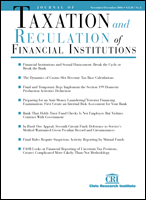Complete Issue
Author: Houman B. Shadab.
Source: Volume 27, Number 03, January/February 2014 , pp.1-60(60)

< previous article |return to table of contents
Abstract:
The first article in this issue addresses the question of whether a U.S. taxpayer can deduct dividends from a registered investment company that are routed through a controlled foreign corporation. According to the Internal Revenue Service (IRS), as Jeffrey Rubinger explains, the answer is no. Mr. Rubinger’s article analyzes how the IRS reached this result in a recent Chief Counsel Memorandum by employing the substance-over-form and step-transaction doctrines. In what seems to be a trend, governmental authorities are being increasingly aggressive in bringing actions against financial institutions and their employees. In our second article, Benton J. Campbell, William O. Reckler, and Brigid Morris discuss federal prosecutors’ increasing reliance on the Financial Institutions Reform, Recovery and Enforcement Act of 1989 (FIRREA), which makes it easier for the government to pursue in civil actions what may otherwise be criminal acts. The authors discuss recent applications of FIRREA against prominent financial institutions and how this impacts the decision whether to settle or litigate a case. In our third article, R. Daniel O’Connor, Steven S. Goldschmidt, and Daniel V. McCaughey discuss another aspect of the trend toward more aggressive federal action against financial institutions: the Securities and Exchange Commission’s change in policy on requiring defendants to admit guilt before settling an enforcement action. The authors discuss recent examples where institutions had to admit guilt in order to obtain a settlement, and consider the implications of the new policy, including how it may influence other financial regulators. Ethan Silver and Faith Colish, in our fourth article, discuss recent developments in the legal and regulatory landscape affecting investment fund marketing to investors. Of particular concern is whether fund marketers will be regulated as brokers by the SEC and subject themselves or a fund to civil liability in the form of rescission. The issue of how credit card issuers (or holders of credit card receivables) should classify credit card interest for tax purposes is the subject of our fifth article, by Joseph Mandarino. He notes that because credit cards have the unique feature of not charging interest if paid in full during the grace period, typical tax classifications may be difficult to apply. Nonetheless, he argues for classifying the interest income under original issue discount rules (unless the IRS takes a different position). We conclude this issue with a U.S.-International column. Jay R. Nanavati discusses the implications of a new and aggressive Department of Justice program meant to penalize Swiss banks that still had U.S. accounts on or after August 1, 2008—accounts which U.S. authorities believe likely facilitate tax evasion by U.S. taxpayers. Mr. Nanavati discusses the genesis of the program and its unique aspects, including its broad definition of what constitutes a “U.S. Related Account,” and its strict penalties.Keywords: Dividends-Received Deduction; Financial Institutions Reform, Recovery, and Enforcement Act; SEC civil enforcement actions; credit card receivable; FATCA Non-Prosecution Agreements
Affiliations:
1: New York Law School.